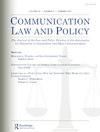传播犯罪:澳大利亚间谍法对全球媒体的启示
IF 0.2
Q4 LAW
引用次数: 1
摘要
间谍活动已成为数字时代国家安全的主要威胁。与传统的战时间谍战术不同,现在的间谍活动包括演员——包括记者——获取敏感信息并在网上向全球观众发布。必须解决这一威胁;然而,过于宽泛的间谍法有可能将合法的新闻定为犯罪,并压制自由表达。本文探讨了澳大利亚2018年广泛的反间谍框架对外国媒体的影响。它认为,这一系列广泛的违法行为为全球媒体报道影响澳大利亚国家利益或外交关系的问题创造了复杂的风险环境。对于外国政府拥有或控制的媒体机构及其记者、消息来源和同事来说,这些风险更加严重。我们考虑了域外执法的实际和政治可能性是否减轻了法律的潜在影响,并主张进行有针对性的改革,以保护全球范围内的新闻自由。本文章由计算机程序翻译,如有差异,请以英文原文为准。
Crimes of Communication: The Implications of Australian Espionage Law for Global Media
Abstract Espionage has emerged as a leading national security threat for the digital age. Far from traditional wartime spy tactics, espionage now includes actors—including journalists—accessing and publishing sensitive information online to a global audience. This threat must be addressed; however, overbroad espionage laws have the capacity to criminalize legitimate journalism and chill free expression. This article examines the implications of Australia’s expansive 2018 counterespionage framework for foreign media. It argues that this broad suite of offenses creates a complex risk environment for global media reporting on issues that impact Australia’s national interest or foreign relations. These risks are exacerbated for media organizations owned or controlled by foreign governments and their journalists, sources, and associates. We consider whether the practical and political likelihood of extraterritorial enforcement alleviates the potential impact of the laws and argue for targeted reform to protect press freedom on a global scale.
求助全文
通过发布文献求助,成功后即可免费获取论文全文。
去求助
来源期刊
CiteScore
0.60
自引率
33.30%
发文量
7
期刊介绍:
The societal, cultural, economic and political dimensions of communication, including the freedoms of speech and press, are undergoing dramatic global changes. The convergence of the mass media, telecommunications, and computers has raised important questions reflected in analyses of modern communication law, policy, and regulation. Serving as a forum for discussions of these continuing and emerging questions, Communication Law and Policy considers traditional and contemporary problems of freedom of expression and dissemination, including theoretical, conceptual and methodological issues inherent in the special conditions presented by new media and information technologies.

 求助内容:
求助内容: 应助结果提醒方式:
应助结果提醒方式:


